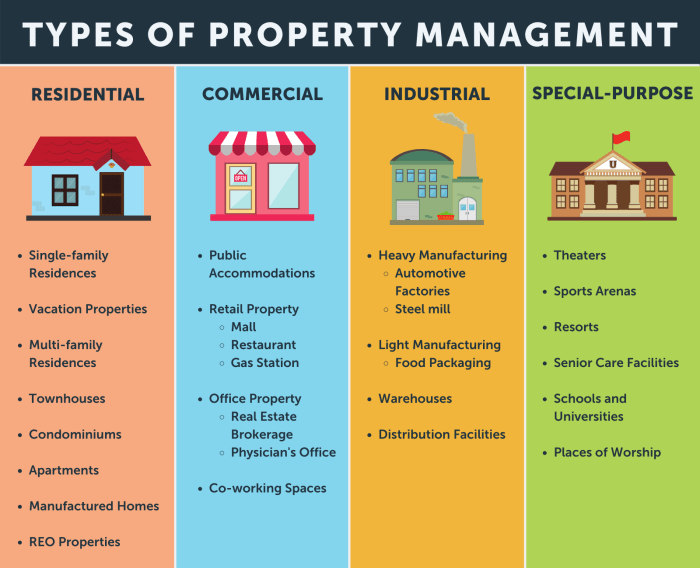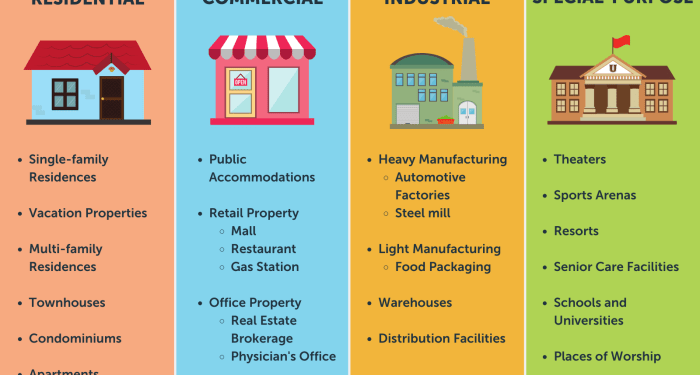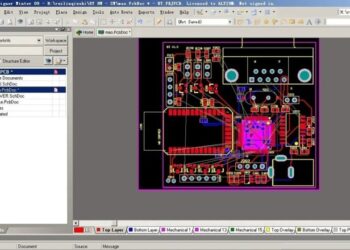Embark on a journey through the realm of real estate property management, where every detail plays a crucial role in the success of property owners and tenants alike. This overview delves into the intricate web of responsibilities and practices that define this vital field.
From tenant screening to financial management, legal aspects to technological advancements, the domain of real estate property management is multifaceted and ever-evolving.
Overview of Real Estate Property Management
Real estate property management involves the operation, control, and oversight of real estate properties. It includes tasks such as handling maintenance, rent collection, tenant relations, and financial management to ensure the property is well-maintained and profitable.
Importance of Property Management in Real Estate
Property management plays a crucial role in the real estate industry for various reasons:
- Maximizing Property Value: Property managers work to enhance the value of the property through strategic maintenance and improvements.
- Ensuring Tenant Satisfaction: Good property management leads to happy tenants, which can result in longer lease agreements and lower turnover rates.
- Legal Compliance: Property managers ensure that the property complies with all local, state, and federal laws and regulations.
- Financial Management: They handle rent collection, budgeting, and financial reporting to ensure the property remains profitable.
Key Responsibilities of Property Managers
Property managers have a range of responsibilities that are essential for the successful management of real estate properties:
- Property Maintenance: Overseeing repairs, maintenance, and improvements to keep the property in good condition.
- Tenant Relations: Handling tenant inquiries, addressing complaints, and ensuring tenant satisfaction.
- Lease Management: Managing lease agreements, renewals, and terminations in compliance with legal requirements.
- Financial Management: Setting rental rates, collecting rent, paying expenses, and maintaining financial records.
- Vacancy Management: Marketing vacant units, screening potential tenants, and filling vacancies promptly.
Property Management Services
When it comes to property management services, companies offer a range of solutions to help property owners effectively manage their investments. These services can vary depending on the company and the specific needs of the property owner.
Common Services Offered
- Rent Collection: Property managers handle rent collection, ensuring that tenants pay on time and addressing any late payments.
- Property Maintenance: They oversee maintenance and repairs, ensuring that the property is well-maintained and addressing any issues promptly.
- Tenant Screening: Property managers conduct thorough background checks on potential tenants to find reliable and responsible renters.
- Lease Management: They handle lease agreements, renewals, and terminations, ensuring that all legal aspects are covered.
- Financial Reporting: Property managers provide detailed financial reports to property owners, keeping them informed about their investment's performance.
Tenant Screening and Selection Process
Tenant screening is a crucial part of property management to ensure that reliable tenants occupy the property. The process typically involves:
- Collecting rental applications with detailed information about the prospective tenants.
- Conducting background checks, including credit history, criminal record, and rental history.
- Verifying income and employment to assess the tenant's ability to pay rent.
- Contacting references to gather insights into the tenant's behavior and reliability.
- Making a final decision based on the gathered information to select the most suitable tenant.
Maintenance and Repairs Handling
Property managers play a critical role in ensuring that the property is well-maintained and any repairs are addressed promptly. The process typically involves:
- Regular property inspections to identify maintenance needs and address them proactively.
- Responding to tenant maintenance requests promptly and coordinating repairs with trusted vendors.
- Ensuring that all repairs are completed to a high standard and in compliance with regulations.
- Managing maintenance budgets effectively to optimize property performance and value.
Legal Aspects in Property Management
Property managers need to adhere to key legal requirements to ensure compliance with regulations and protect both landlords and tenants.
Importance of Lease Agreements
Lease agreements are crucial in property management as they Artikel the terms and conditions of the rental agreement between the landlord and tenant.
- Lease Duration: Specifies the length of time the tenant is allowed to occupy the property.
- Rental Amount: States the monthly rent amount and due date for payments.
- Security Deposit: Defines the amount required and conditions for refund at the end of the lease.
- Rules and Regulations: Sets out guidelines for tenant behavior, property maintenance, and any restrictions.
Eviction Process and Laws
The eviction process is a legal procedure that property managers must follow to remove a tenant from the property for non-compliance with the lease agreement or other valid reasons.
- Notice to Quit: Property managers must provide tenants with a written notice to vacate the property within a specific timeframe.
- Court Proceedings: If the tenant refuses to leave, property managers may need to file for eviction in court and attend a hearing.
- Writ of Possession: If the court rules in favor of the landlord, a writ of possession is issued to physically remove the tenant from the property.
Financial Management in Real Estate
Property managers play a crucial role in handling the financial aspects of real estate properties. From rent collection to budgeting, their responsibilities are vital in maximizing property income.
Rent Collection and Rental Rates
Property managers are responsible for collecting rent from tenants in a timely manner. They ensure that rental rates are set at competitive prices based on market trends and the property's value.
- Property managers set rental rates by conducting market research to determine the optimal price.
- They establish clear rent collection policies and enforce them consistently to avoid late payments.
- Property managers handle rent increases or decreases based on factors such as demand, property condition, and market fluctuations.
Budgeting and Financial Reporting
Effective budgeting and financial reporting are essential for property management to ensure financial stability and growth.
- Property managers create annual budgets that Artikel expected income and expenses for the property.
- They monitor expenses closely and make adjustments to the budget as needed to maintain profitability.
- Financial reporting involves preparing detailed reports on the property's financial performance, including income, expenses, and cash flow.
- Property managers use financial reports to analyze the property's financial health and make informed decisions to maximize income.
Maximizing Property Income
Property managers play a key role in maximizing property income by implementing strategies to increase revenue and reduce expenses.
- They identify opportunities to increase rental income, such as adding amenities, upgrading units, or adjusting rental rates.
- Property managers negotiate contracts with vendors and service providers to get the best rates and reduce operating costs.
- They maintain the property's condition to attract and retain tenants, reducing vacancies and increasing income.
- Property managers continuously analyze the property's performance and make data-driven decisions to optimize income and ensure financial success.
Technology in Property Management

Technology has revolutionized the way property management is conducted, offering numerous benefits to property managers and landlords. From streamlining processes to improving communication with tenants, technology plays a crucial role in modern property management practices.
Property Management Software
Property management software has become an essential tool for property managers, providing a centralized platform to efficiently manage properties, tenants, leases, maintenance requests, and financial transactions. This software automates many tasks, saving time and reducing human error. It also allows for easy access to important data and analytics, enabling better decision-making.
- Automating rent collection and lease renewals
- Tracking maintenance requests and scheduling repairs
- Generating financial reports and analyzing property performance
- Improving communication with tenants through online portals
Marketing Properties
Property managers leverage technology to market properties effectively, reaching a wider audience and increasing visibility. Online listing platforms, social media marketing, virtual tours, and professional photography are some of the tools used to showcase properties and attract potential tenants. By utilizing technology for marketing, property managers can reduce vacancies and maximize rental income.
- Creating virtual tours to showcase properties to prospective tenants
- Utilizing social media platforms for targeted advertising
- Optimizing property listings on rental websites for better visibility
- Implementing email marketing campaigns to promote available properties
Wrap-Up
In conclusion, real estate property management stands as the cornerstone of successful property ownership, blending legal expertise, financial acumen, and technological innovation. As the industry continues to adapt and grow, the role of property managers remains essential in ensuring seamless operations and maximizing returns for all stakeholders.
FAQ Resource
What are the key responsibilities of property managers?
Property managers oversee various tasks such as tenant communication, property maintenance, rent collection, and ensuring legal compliance.
How do property managers handle maintenance and repairs?
Property managers typically coordinate repairs and maintenance through trusted contractors or in-house maintenance staff, ensuring timely and cost-effective solutions.
What legal requirements must property managers adhere to?
Property managers need to comply with laws related to tenant rights, fair housing practices, property safety standards, and lease agreements.
How do property managers maximize property income?
Property managers optimize rental rates, minimize vacancies, reduce operating costs, and implement strategic marketing strategies to increase property income.












